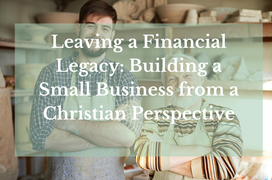Leaving a Financial Legacy: Building a Small Business from a Christian Perspective
Posted by Kellie on Apr 15th 2024
Why We Launched a Small Business: Our Motives and Vision for its Growth
In the pursuit of financial stewardship and leaving a lasting legacy, Christians often seek to build wealth not just for personal gain but also to impact future generations positively. One powerful way to achieve this is by establishing a family-owned small business that can grow and thrive across generations. In this blog post, we'll explore the benefits of this approach from a Christian perspective, emphasizing the value of teaching life and business skills to our children as they grow.
The Biblical View on Stewardship
Central to the Christian faith is the concept of stewardship—managing and using resources wisely according to God’s principles. In the parable of the talents (Matthew 25:14-30), Jesus teaches about the importance of investing and growing what has been entrusted to us. This principle extends beyond finances to include skills, relationships, and opportunities. Establishing a family business aligns with this biblical principle by leveraging resources to create lasting value and impact.
Benefits of a Family Business
- Generational Wealth Creation: Unlike many jobs or investments, a family business can be a source of ongoing income and wealth across generations. By starting a business early and nurturing it over time, you're laying a foundation for your children and grandchildren to benefit from.
- Shared Values and Vision: A family business allows you to instill and pass down important values and a sense of purpose. The business becomes a tangible expression of your family’s ethos, rooted in Christian principles like integrity, fairness, and service.
- Teaching Life and Business Skills: Running a business requires a diverse set of skills—financial management, leadership, marketing, problem-solving, and more. Involving your children in the business from a young age provides practical training and discipleship opportunities. They learn firsthand about hard work, perseverance, and relying on God’s guidance in decision-making.
Practical Steps to Building a Family Business
- Start Small and Dream Big: Begin with an idea that aligns with your passions and skills. It could be a craft, service, or product that meets a specific need in your community.
- Involve the Family: Encourage your children to participate in age-appropriate tasks within the business. This could range from helping with simple chores to shadowing you during meetings or strategy sessions as they mature.
- Emphasize Learning: Use the business as a platform for teaching. Discuss financial principles, ethical business practices, and the importance of serving others. Mentor your children in setting goals and managing resources wisely.
- Adapt and Grow: As your business matures, be open to innovation and change. Involve your children in decision-making processes and empower them to contribute their ideas.
Leaving a Spiritual Legacy
Beyond the financial aspects, building a family business from a Christian perspective is about leaving a spiritual legacy. It's about sowing seeds of faith, diligence, and creativity in the hearts of your children and grandchildren. As they witness the ups and downs of entrepreneurship, they'll also witness God’s faithfulness and provision firsthand.




